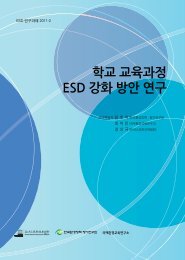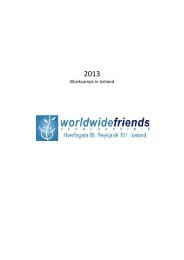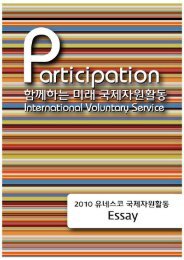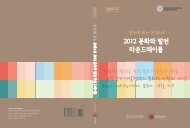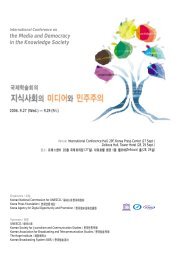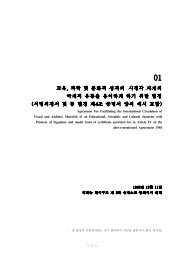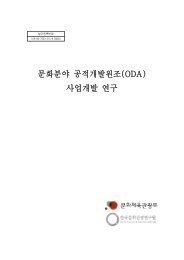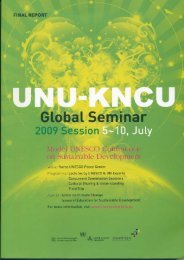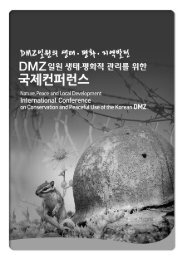Untitled
Untitled
Untitled
You also want an ePaper? Increase the reach of your titles
YUMPU automatically turns print PDFs into web optimized ePapers that Google loves.
community can survive when it satisfies the basic needs of its members, when it<br />
guarantees equality and justice, and when it provides education, technology and<br />
health for its components (social sustainability).<br />
Environmental sustainability, economic sustainability, and social sustainability<br />
are closely linked with each other rather than being individually separated from each<br />
other, and therefore calls for common efforts made by all. By all I mean global<br />
society as a whole, surpassing national borders. This is because in the end, the<br />
social problem is the problem of poverty and development on the global scale, just<br />
as much as the environmental problem is a global one and the economic problem is<br />
a North-South issue. In this light, “common but differentiated responsibility” was<br />
proposed in the Rio Declaration. According to this principle, developed nations must<br />
encourage changes in daily habits and consumption patterns and contribute to<br />
solving the global poverty issue. Similarly, developing nations must go through<br />
changes to achieve sustainable growth in both economy and society.<br />
3. Sustainable Development and Green Growth 48<br />
A. Criticisms against Sustainable Development<br />
So far, the concept of sustainable development was based on the reflection on<br />
our way of life and development. Thus, it emphasizes the paradigm shift to a new<br />
socio-economic system and lifestyle that focuses on ecological principles and an<br />
environmental point of view. Wisely using the natural ecology, which is the basis of<br />
human activities in the economic and social sphere, we may enrich ecology and<br />
human lives, thereby reproducing more developed ecology and society, in a society<br />
rooted on healthy ecology. But until now, the definition of sustainable development,<br />
provided through various channels, has been too simple and too abstract to<br />
overcome its innate complexity and self-contradiction.<br />
Bartemus argued that we must interpret sustainable development as a practical<br />
goal rather than as a concept (Bartemus, 1999). But sustainable development has<br />
been unable to provide a concrete basis for practical measures since the concept<br />
itself is too vague. As many scholars have argued, the description for sustainable<br />
development was too abstract and vague in fact. People were not able to reach<br />
agreement on the concept of sustainable development due to differing<br />
interpretations and a lack of understanding. Communication problems between<br />
relevant stake-holders arose when applying and practicing sustainable development<br />
because each of them emphasized interests of their own according to their positions.<br />
<br />
48 This part is a revised excerpt from Geun-ho Lee, Sang-joon Nam, Chan-guk Kim (2009), “Studies on How<br />
to Integrate Green Growth Contents into Curriculum.” 2008. Reply Report for Entrusted Assignment on<br />
Policy Research for the Ministry of Education, Science and Technology.



